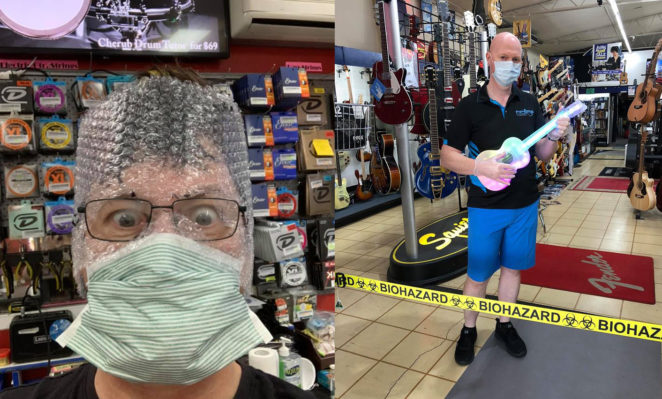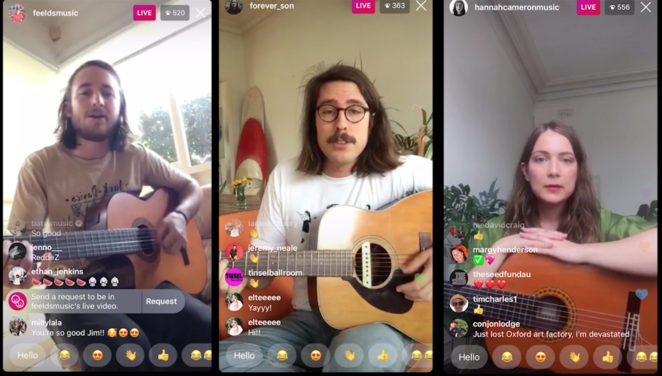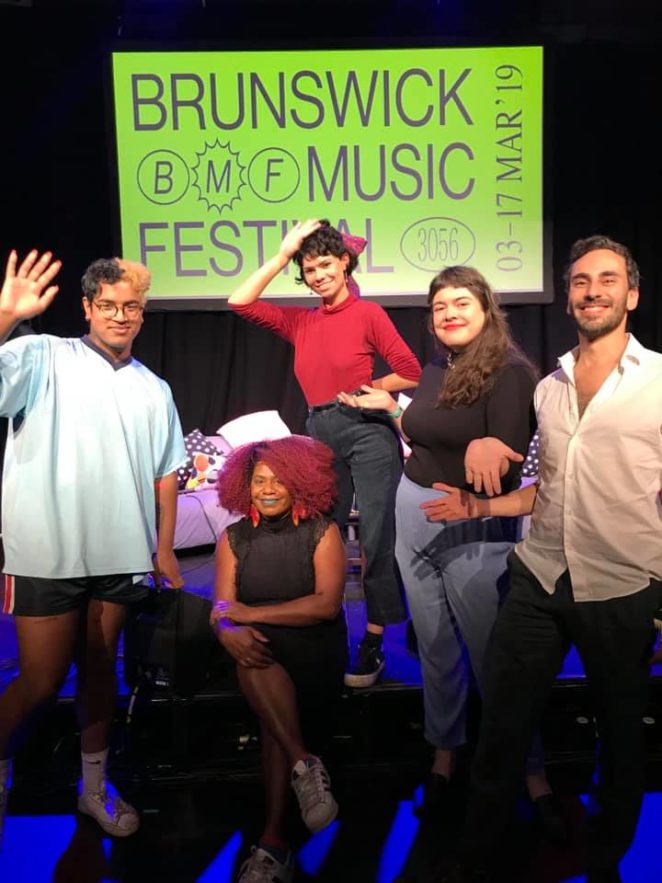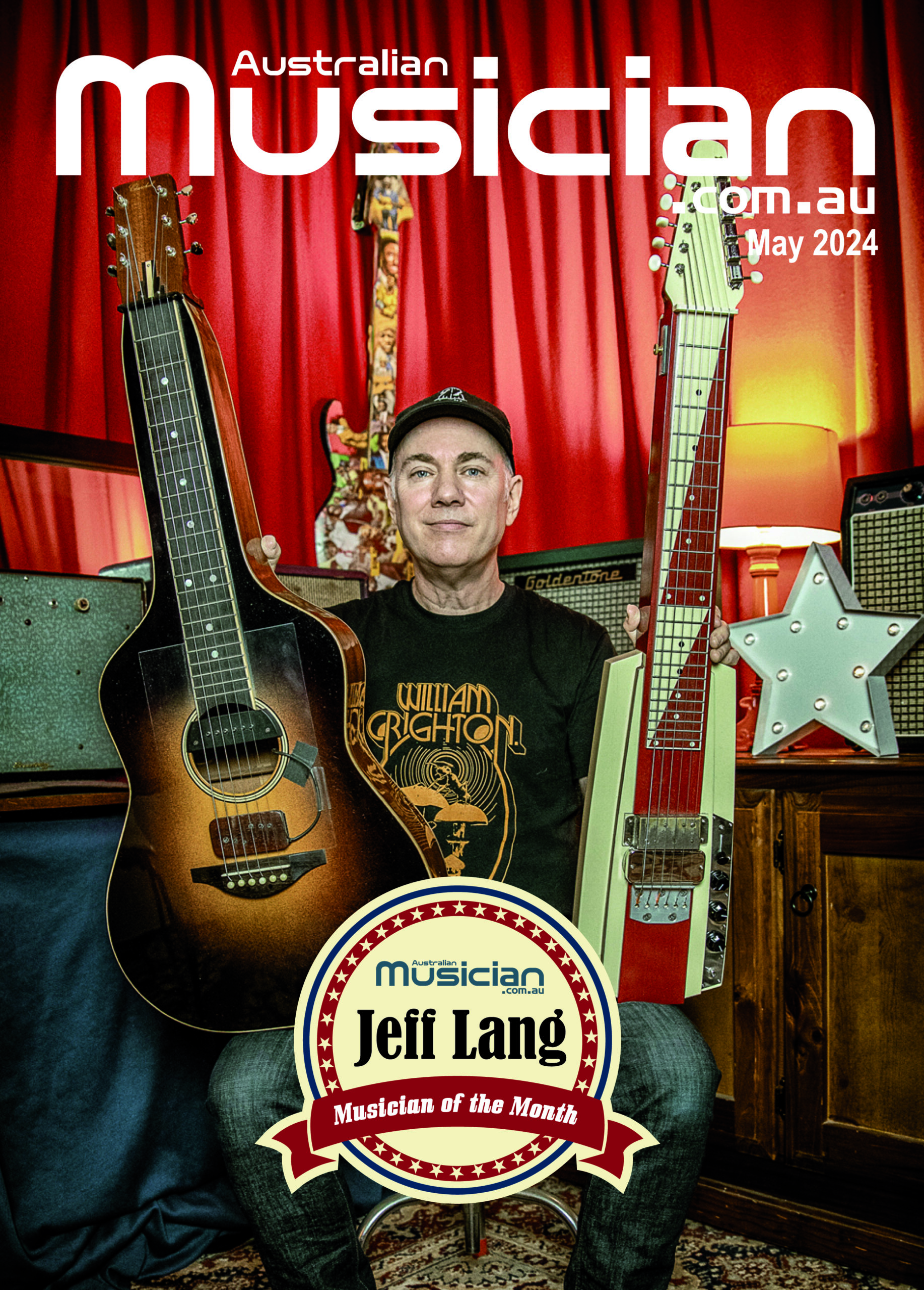
Watching the constant flow of gloomy Covid-19 news on television on a daily basis can be an overwhelming experience. Many casual workers, particularly those in the arts have lost their income and are struggling. A large number of artists are now having to deal with the quirks of the government’s website, then anxiously await word on whether they qualify for funding or not. Even if you’ve kept your day job and now working from home, it’s not easy to be motivated in the morning, to get dressed in clothes other than your tracky dacks and a stained T-shirt for your Zoom meeting or livestream. In such a negative frame of mind, it’s easy to miss the light amid the darkness. However if you look at life from another perspective, there’s still much to be grateful for, particularly for us here in Australia. The air is cleaner (confirmation that humans are responsible for pollution and are capable of reducing it), many families are spending more quality time together, cooking and playing games, listening to and playing music. Many of us are learning new skills that we never thought we’d have time to do and a lot of us are just enjoying listening to music. As an aside, it’s also been confirmed via an extreme lack of interest that Instagram ’influencers’ are irrelevant and that’s got to be a good thing!
Rather than wallow in a mire of misery, we sought to find as many positives as possible in our wonderful music world during the lockdown. Here’s ten silver linings we have come up with.
1. PEOPLE TURN TO MUSIC IN TROUBLED TIMES
As the coronavirus became more serious in Europe and the population of countries such as Italy were sent into enforced lockdown, it’s no surprise that people impulsively appeared on their balconies singing and playing instruments, connecting with each other and spreading joy. Balcony dance parties emerged, travelling musicians played from the back of trucks in suburban streets, entertaining those who had little access to anything else. On social media, musicians worldwide played for their essential workers, the essential workers played music for their own sanity. In the virus epicentre city Wuhan, its citizens were chanting “Keep it up, Wuhan!” and singing patriotic songs from their windows, encouraging each other to adhere to lockdown laws. Music will always conjure a wide range of emotions and in good times and bad, people turn to their favourite music to help them ride the wave of feelings they are going through. As always it’s the music community that comes together in the face of disasters to offer relief. Just as musicians worldwide came together to raise money for Bushfire relief last summer, it’s the artists again who are front and centre during Covid-19, raising funds and lifting spirits.
2. MANY MUSIC STORES ENJOYED CHRISTMAS-LIKE SALES FIGURES IN MARCH
While your average Joe and Joan were fighting over toilet paper, worried that it was quickly going out of style, musicians Australia-wide were engaging with their local musical stores, stocking up on new music gear and accessories, arming themselves for the lockdown. While many retailers in shopping malls were closing their doors, many music stores, particularly those with strong online presence were doing Christmas-like sales figures. For those musicians uneffected financially by the virus, this was a chance to purchase their dream instrument. For those who had never played an instrument before, this was a perfect time to learn. Then there are those career musicians who just needed to know they’d have a good supply of strings, picks, sticks and other essential music accessories. We shouldn’t be surprised, there’s historical precedence for this behaviour. During the Great Depression there was a great demand for pianolas. People stayed at home and sat around the pianolas singing. There was a 20 year run of pianolas as people needed something communal to latch onto and during the Great Depression, that was music.

3. NEW MUSICIAN BOOM
Knowing that people were going to be at home looking for things to do, in March this year Fender offered a 3 month free deal on their learn-to-play Fender Play app to the first 100,000 who registered. Merely days later so many new musicians had downloaded the app, that they extended the offer to the first 500,000 people. By April 10, Fender were so overwhelmed that the offer has now been extended to one million people. “We’re blown away by the overwhelming response to our three months of free guitar, bass, and ukulele lessons on Fender Play,” said Fender CEO Andy Mooney. “We started by providing complimentary lessons to the first 100,000, but quickly surpassed that number in just three days.” Witnessing the success of the Fender Play app, other music companies began offering similar deals, such as Roland with their free piano lessons through Skoove, followed by an extended deal on their Zenbeats DAW app. Music stores were also reporting high sales of entry level instruments and tuition books. We’re also seeing a surge in downloads of home recording software. Rolling Stone magazine this week reported that “there’s been a 55% increase in Google searches for Apple’s Garageband music creation software. Apple confirms the company is seeing record levels of interest in Garageband, with nearly 13 million downloads from its add-on “Sound Library” since early February — and hundreds of thousands of free trial downloads of Garageband’s pricier siblings Logic Pro X and Final Cut Pro X.” There were plenty of entry level instruments sold in March too according to many retailers. There’s a hell of a lot of music making going on at the moment and the next generation of artists is going to be amazing.
4. INNOVATION
When the going gets tough, musicians get innovative. One of the first success stories to come out of the Covid-19 lockdown was the Melbourne-born Instagram Live Music Festival called Isol-Aid. Three gigless music industry workers Merpire (Rhiannon/ Small Time Group), festival organiser and musician Emily Ulman (Brunswick Music Festival/Small Time Group) and Shannen Egan (Turning Heads Agency) created a two day online festival. Their humble aim was to raise funds for music industry charity group Support Act, give the artists some exposure and the chance to sell some product, and also to try to lift the spirits of the devastated local music community. Playing live from bedrooms, lounge-rooms, studios or wherever they were self-isolating, participating artists each play a 20-minute set streamed live on their Instagram accounts, and then tag-teamed the next artist to play, sending fans down a rabbit-hole of new music discovery. Gaining much support and international recognition, Isol-Aid has since become a weekly occurrence.

Other livestream concepts have since emerged too such as the ticketed Delivered Live, a regular concert livestreamed concert series filmed from a purpose built studio with professional quality sound and vision. Venues such as Memo Music Hall in St. Kilda have also turned to crowd-less gigs streamed to your home for a nominal cost. Although a little later to the party, the major music players have also become involved presenting us with the huge Global One World Together At Home, featuring artists such as Elton John, Beyonce, Taylor Swift and Paul McCartney etc. Just last weekend Australia’s version of a massive virtual gig came in the form of Anzac Day’s Music From The Home Front featuring high profile Australian and New Zealand artists performing from home.
5. THE GREAT LEVELLER
Without their extensive production elements behind them, the world’s biggest artists are having to perform stripped back and unplugged from home, the same as every other artist in the world. Watching some of the best known singer songwriters on the planet perform with just an acoustic guitar or piano is suddenly not so different to watching your local busker or front bar regular with an equally powerful voice. With such a level playing field, it opens up a lot of possibilities to undiscovered talent to get noticed and never before have so many people been online, the potential audience is massive. The social media microscope is also revealing that some established artists are not quite what they seem without the bells and whistles. It has also started a whole new curiosity of peeking into the homes of artists worldwide, with fans commenting on their taste in kitchens, books, plants and wall art.
Our advice to indie artists is to not waste this opportunity if you can help it! Use this time wisely as you may not ever get this captive audience and the ‘time’ opportunity again. Hone your musical chops, tweak those songs, write new ones, storybook video clip ideas, educate yourself in marketing and social media. Just as you’d rehearse for a show, plan your livestreams. Think about the background and quality of sound and vision. Watch other live streams and see what’s working, what’s not and investigate why. There is much that musicians can do while in this holding pattern, get creative during this period and hit the ground running when the world begins to open up again. Of course, if it’s all a bit overwhelming and you need to chill, then that’s perfectly ok too.
6. KINDNESS
 As seen during the bushfire devastation and again during the coronavirus period, we see a small element of the worst in people but in general we mainly see their best. There have been so many acts of random kindness emerge lately and as you’d expect many have come from the world of the arts. Only just last week, the wonderful Moreland City Council, organisers of the annual Brunswick Music Festival decided to pay each and every artist that performed or didn’t perform when the festival was cut short due to lockdown restrictions. Of course the amazing music industry support charity Support Act has been overwhelmed with donations this year and thankfully so, as many struggling artists are now in need of assistance. Many Australian artist livestream gigs have tagged and encouraged people to donate to Support Act.
As seen during the bushfire devastation and again during the coronavirus period, we see a small element of the worst in people but in general we mainly see their best. There have been so many acts of random kindness emerge lately and as you’d expect many have come from the world of the arts. Only just last week, the wonderful Moreland City Council, organisers of the annual Brunswick Music Festival decided to pay each and every artist that performed or didn’t perform when the festival was cut short due to lockdown restrictions. Of course the amazing music industry support charity Support Act has been overwhelmed with donations this year and thankfully so, as many struggling artists are now in need of assistance. Many Australian artist livestream gigs have tagged and encouraged people to donate to Support Act.
Globally, some of the world’s biggest stars have opened their hearts and wallets too. Beyonce announced a donation of $6m for mental health and other initiatives during the covid-19 outbreak. Pink, who had already donated a million dollars to Australian bushfire relief, donated another million to coronavirus-related funds. Pink herself and her son had tested positive to the virus. Slipknot’s Corey Taylor launched a special guitar auction with eBay to benefit Direct Relief in support of their COVID-19 response efforts. Adam Lambert’s Feel Something Foundation auctioned off stage outfits on eBay to benefit GLAAD, which is providing aid to the LGBTQ community during the coronavirus pandemic. Madonna teamed up with REFORM Alliance to donate 100,000 masks to jails and prisons in the hopes of curbing the spread of the coronavirus behind bars. Dolly Parton pledged $1 million to the Vanderbilt University for virus research. James Taylor and his wife Kim donated $1 million to Massachusetts General Hospital. Willie Nelson’s virtual Farm Aid concert on April 11 raised more than $500,000 for family farmers and ranchers who have been impacted during the pandemic. Elton John’s AIDS foundation launched a $1million COVID-19 Emergency Fund to make sure that frontline partners can respond to the effects of COVID-19 on HIV care for the most marginalised communities around the world.
7. SOCIAL MEDIA MUSIC SHARING
Anyone who has a social media account of any kind would probably have been nominated by a friend to upload your favourite albums, concerts, photos of attending a music gig or making music. It’s been fascinating to see the artists and albums that have made up the soundtrack of people’s lives and what led them to their current music tastes. While many have avoided such sharing games in the past, they’ve been more inclined to do so now, feeling a little more sentimental than usual. It’s another example of music connecting people who are hungry for social contact, a simple act but a great conversation starter.
8. SELF-EDUCATION
One of the factors that has forever prevented many of us from learning a new skill is lack of time. For most, that’s no longer an excuse and musicians are taking the opportunity to learn a little bit more about a wide range of activities including: social media skills, music business, learning another instrument, learning other songs and a whole wave of audio and visual solutions to issues that they’ve had in the past. A lot of artists are going to come out of this period much better equipped than they were pre-covid-19.
9. ONLINE MUSIC LESSONS FROM HIGH PROFILE ARTISTS
With many of Australia’s top touring musicians off the road, they’re now offering online music lessons. As reported by ABC news, sought-after musicians such as drummer Josh Schuberth (Ben Folds, Josh Pyke, Alex Lloyd), high profile country artists Catherine Britt and Lyn Bowtell, and many others can now be contacted for online teaching. The isolation has created a unique opportunity for people to learn from successful recording and touring artists. Keep your eyes peeled for online lesson opportunities from your fave musicians and producers.
10. TIME
With physical album sales down on the golden days and streaming services offering little money for the use of artists’ music, it was touring and merch that was making a buck for artists. However being on the road for extended periods meant that less time was spent sitting down and being creative. With Covid-19 forcing artists into isolation, many are thriving creatively as they now find themselves with time to dedicate to their music. Artists are able to tweak their lyrics a little bit more or re-record those guitar parts as many times as they like or try songs in many different tempos, when previously they may have been more inclined to let the gremlins go in order to get the project done by a certain deadline. We’ve also heard from many band members telling us that they intend to finally work on their solo albums. Also, maybe it’s just a great time to revisit your favourite albums or music documentaries and just take it all in and remember why you got into music in the first place.
Of course we realise that these are incredibly tough times and we are certainly not being flippant, we’re merely shining a little light by pointing out the positive elements of a very difficult situation. Clearly, to be in a creative headspace, artists need to be motivated and mentally healthy. If anyone is struggling at the moment, they should seek help through programs such as Beyond Blue and music industry support group Support Act. We also urge everyone to donate to Support Act if you’re able to.
by Greg Phillips


